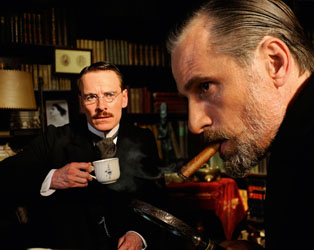Welcome to
the IFI’s March programme and a truly global selection of films that spans
Iran, Algeria, Turkey, Austria and Russia as well as a special profile of some
outstanding home-grown talent.
Trishna
In recent
years Fastnet Films has emerged as one of Ireland’s most ambitious and dynamic
production companies, working with some of this country’s most talented young
filmmakers as well as linking Dublin to Europe through inventive
co-productions. This month sees the release of its latest production, The Other Side of Sleep, which was selected for the prestigious Directors’
Fortnight programme at Cannes. We are marking this great achievement with a
short season of some of the many highlights from Fastnet’s catalogue. We are delighted
to be joined during the season by special guests Jim Sheridan, Stephen Rea,
Lance Daly, Rebecca Daly and Robert Flanagan, as well as producers Macdara
Kelleher and Morgan Bushe. The season and surrounding events offer a
fascinating insight into what it takes to build an international production
company in Dublin from the perspective of some of the leading figures in Irish
film.
The Other Side Of Sleep
The
observant amongst you will notice two new additions to our monthly programme.
Following on from the success of our monthly film club, The Critical Take,
we are introducing Afternoon Talks, an informal programme of free talks
by IFI staff that offers a chance for cinema lovers to delve further into
aspects of our programme, whether it’s a new release, a monthly season, a
festival or a special event. We kick off this month with a fascinating talk by
IFI Curator Sunniva O’Flynn about Ireland’s extraordinary history of priests
and film which inspired Stella Days, and is central to the IFI’s own
rather unique history.
Stella Days
You will
also notice amongst our new releases a new programmer's recommendation of a
film that should not be missed. We are aware that we bring you so many new
features every month and, as much as you would like to see everything, life
intervenes and this is not always possible!
Our IFI programmers, who have the luxury of seeing them all, are best
placed to give you tip-offs on films that you will really regret missing. This
month they have selected Once Upon a Time in Anatolia which opens on
March 16th.
Once Upon a Time in Anatolia
It was with
great sadness that we learnt of the death of David Kelly, one of Ireland’s
best-loved and finest actors. To international audiences, he embodied a quintessential Irish rogue – a
humorous, work-shy scoundrel. To Irish audiences he was admired more perhaps
for his fine acting talent (as he demonstrated as Rashers Tierney in Strumpet
City) and it was a great joy to watch new audiences experience his warmth
and wit as the grandfather in Charlie and the Chocolate Factory. He was
a great friend of the Irish Film Institute and we are honoured to dedicate our
special IFI Irish Film Archive St. Patrick’s Day screening of QuackserFortune to his memory.
Sarah Glennie
Director
For more information, please contact the IFI Box Office on 01 679 3477 or visit www.ifi.ie










+Hollywood+Movie+DVD+Download.jpg)



